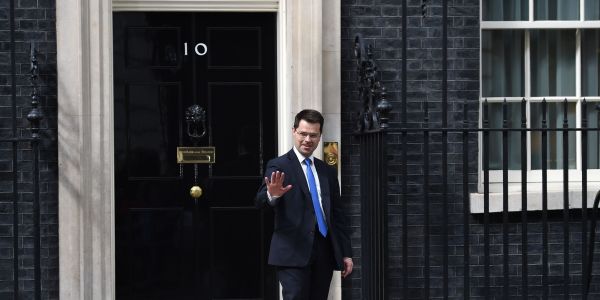Northern Ireland’s new secretary of state has insisted he does not want to see a hardening of the Irish border in the wake of Brexit.
In his first full day in office, James Brokenshire said both the UK and Irish governments were opposed to a return to border check points between north and south.
Concerns about the status of the border after Brexit, and whether free movement of people, goods and services will be impacted, have dominated the political discourse across the island since the UK’s historic vote to leave the EU. In Northern Ireland, 56% of voters backed Remain.
“We certainly don’t want to see a return to the border of the past,” said Mr Brokenshire.
“We don’t want to see that hard border coming into place and I think there is a real sense of commitment between the UK government and also the Irish government to work together very closely so we don’t see that returning.”
Ultimately the shape of the border between the UK and the Ireland will have to be agreed collectively by the EU’s remaining member states.
During the referendum campaign, UK Prime Minister Theresa May indicated some form of border control would be required in Ireland if people in the UK voted to leave the EU.
Unlike his Brexiteer predecessor Theresa Villiers, Mr Brokenshire, a close ally of Britain’s new prime minister, campaigned for Remain.
However, he said the UK now needed to unite and respect the outcome of the referendum.
Following the vote, Sinn Fein restated its demand for a poll on Irish unity, warning that Northern Ireland could not be “dragged out” of the EU against its will.
In an interview with RTE, Mr Brokenshire said: “Now we now need to respect the view from across the United Kingdom that the UK should leave the European Union and to get the best possible arrangements for Northern Ireland – that’s the key part of my role.”
On the question of whether multimillion-pound EU subsidies paid to Northern Ireland farmers will be replaced by the UK government after Brexit, Mr Brokenshire said ministers were “looking very closely” at the issue.
He also expressed confidence that the rights of EU citizens living in the UK, such as those from Ireland, could be guaranteed once the country left the European Union – but only if the rights of UK citizens living in the remaining member states were similarly respected.
Stormont’s deputy first minister Martin McGuinness conceded that he had never heard of Mr Brokenshire before the former home office minister’s appointment was announced on Thursday.
“But I always work on the basis that we have to play the hand we are dealt with,” Mr McGuinness added.
“He is the representative of the British government in relation to the position of Secretary of State and we will work with him, but it has to be on the recognition by both him and the Prime Minister that the people of the north voted to remain.”
Mr McGuinness and Democratic Unionist First Minister Arlene Foster had separate telephone calls with Mr Brokenshire and Mrs May on Thursday.
On Friday, the Sinn Fein MLA reiterated his concern that any hardening of the border would “gravely undermine” the 1998 Good Friday peace agreement.
Mr Brokenshire is anticipated to visit Northern Ireland for the first time in his new job on Monday.
